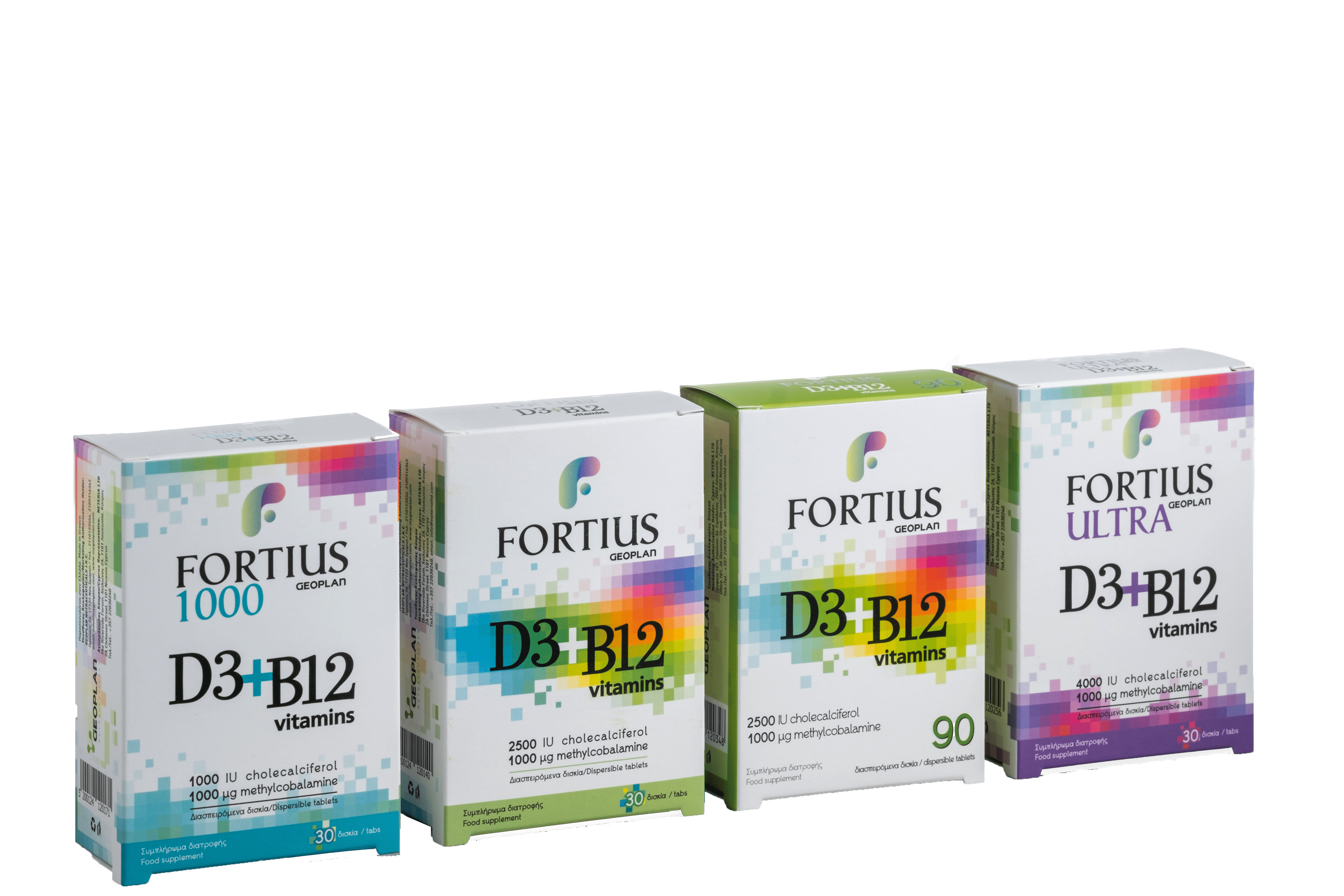FORTIUS D3+B12
FORTIUS D3+B12 SERIES
Fortius D3+B12 series was created to meet all the needs of vitamins D3 and B12 of a modern family through their combination into a single table dispersed in the oral cavity.
With three different D3 concentrations we provide suitable solutions to each customer according to her needs.
A specially designed series for optimised effectiveness.
1000/2500/4000 IU cholecalciferol, 1000μg methylcobalamin
Food supplement
Vitamins D3+B12
30 dispersible tablets
Introduction
FORTIUS D3+B12 is a nutritional supplement with vitamins D3 and B12. These are vitamins of great importance for the proper functioning of the body, but their lack or insufficiency often occurs for many reasons.
FORTIUS D3+B12 is in the form of dispersible tablets. Absorption is sublingual from the oral mucosa bypassing the digestive tract.[1,2] For this reason, it is readily absorbed and acts faster. Moreover, it has easy intake (spread in the mouth) and pleasant taste.
The form of vitamin D used in FORTIUS D3+B12 is D3 (cholecalciferol) as it has much better absorption by the body compared to D2.[3] For the same reason, methylcobalamin has been used as the best source of absorption of B12.
Composition
| FORTIUS D3+B12 1000 | SUPPLEMENT FACTS | ||
|---|---|---|
| Ingredients | Amount per Serving (1 tab) | % N.R.V.* |
| Vitamin D3 (cholecalciferol) | 1000 IU (25,0 μg) | 500 |
| Vitamin B12 (methylcobalamine) | 1000 μg | 40000 |
| FORTIUS D3+B12 | SUPPLEMENT FACTS | ||
| Ingredients | Amount per Serving (1 tab) | % N.R.V.* |
| Vitamin D3 (cholecalciferol) | 2500 IU (62,5 μg) | 1250 |
| Vitamin B12 (methylcobalamine) | 1000 μg | 40000 |
| FORTIUS D3+B12 ULTRA | SUPPLEMENT FACTS | ||
| Ingredients | Amount per Serving (1 tab) | % N.R.V.* |
| Vitamin D3 (cholecalciferol) | 4000 IU (100,0 μg) | 2000 |
| Vitamin B12 (methylcobalamine) | 1000 μg | 40000 |
| *N.R.V.: Nutrient Reference Value Serving size: 1 tab / Servings per Container: 30 |
||
Does not contain: Gluten, artificial colors, lactose, preservatives
Vitamin D3
According to a recent study, 73% of Greeks and 69% of Cypriots have insufficient levels of vitamin D.
*Xyda SE et al, The prevalence of Vitamin D deficiency in a Greek and a Cypriot population sample. Endocrine Abstracts (2018) 56 P212.
Vitamin D, through its receptors, interacts with more than 2000 genes in the human body which in turn encode proteins that play an important role in regulating, differentiating and propagating cells.
Cholicalciferol (D3) is the natural form and increases the levels of total vitamin D more effectively.
According to the European Food Safety Authority (EFSA), vitamin D3 contributes to
- normal absorption of calcium and phosphorus resulting in strong bones, muscles and teeth
- reduce inflammation
- setting and strengthening the immune system
- maintaining muscle strength
- controlling blood sugar
- it plays an important role in the pathogenesis of autoimmune diseases, such as multiple sclerosis, type 1 diabetes, rheumatoid arthritis, psoriasis, celiac disease, Crohn’s disease.
Groups of people with common vitamin D deficiency
- Vegetarians
- Elderly
- Persons with limited sun exposure and urban residents
- People with bone diseases
- Athletes
- People with chronic diarrheal syndromes and inflammatory bowel diseases
- People with respiratory infections
- Diabetes
- Pregnant and breastfeeding women
- Multiple Sclerosis
Vitamin Β12
A water-soluble vitamin of the B complex that is involved in the metabolism of every cell of the human body.
Methylcobalamin is the most active physical form of vitamin B12.
The tablets are dispersed in the oral cavity, pass immediately and easily into the bloodstream resulting in maximum absorption of B12 from the body.
According to the European Food Safety Authority (EFSA) vitamin B12 plays a key role
- in DNA synthesis
- in metabolism of homocysteine
Contributes to
- good functioning of the nervous system
- good functioning of the immune system
- normal formation of red blood cells
- reducing of tiredness and fatigue
Groups of people with common vitamin B12 deficiency
- Megaloblastic anemia
- Elderly and depressed people
- Vegetarian diet
- Alzheimer’s disease
- Contraceptives
- Diabetes and patients taking metformin to regulate blood glucose levels
- Digestive disorders and patients taking medication for gastric or peptic ulcers
- Inflammatory Bowel Diseases
- Low bone density
References
- Commission regulation (EU) No 432/2012 of 16 May 2012, Official Journal of the European Union.
- Singhellakis PN et al, Vitamin D deficiency in white, apparently healthy, free-living adults in a temperate region. Hormones (Athens). 2011 Apr-Jun;10(2):131-43.
- Parathyroid Gland Response to Vitamin D Deficiency in Type 2 Diabetes Mellitus: An Observational Study
- The Correlation between Serum Vitamin D Level and Total Antioxidant Capacity in Diabetic and Non-diabetic Subjects in Iran
- Maternal factors associated with neonatal vitamin D deficiency
- Do Maternal Vitamin D Levels Influence Vitamin D Levels in Preterm Neonates?
- Influence of Diet in Multiple Sclerosis: A Systematic Review1,2
- Vitamin D and Multiple Sclerosis: A Comprehensive Review
- Iqbal SP et al, Vitamin B12 deficiency-a major cause of megaloblastic anaemia in patients attending a tertiary care hospital. J Ayub Med Coll Abbottabad. 2009 Jul-Sep;21(3):92-4.
- Correlation of folate, vitamin B12 and homocysteine plasma levels with depression in an elderly Greek population
- Suboptimal Baseline Serum Vitamin B12 Is Associated With Cognitive Decline in People With Alzheimer’s Disease Undergoing Cholinesterase Inhibitor Treatment
- Effect of hormonal contraceptives on vitamin B12 level and the association of the latter with bone mineral density
- Mazokopakis EE et al, Recommendations for diagnosis and management of metformin-induced vitamin B12 (Cbl) deficiency. Diabetes Res Clin Pract. 2012 Sep;97(3):359-67.
- Heidelbaugh JJ. Proton pump inhibitors and risk of vitamin and mineral deficiency: evidence and clinical implications. Ther Adv Drug Saf. 2013 Jun;4(3):125-33.
- Linder L et al, Drug-Induced Vitamin B12 Deficiency: A Focus on Proton Pump Inhibitors and Histamine-2 Antagonists. J Pharm Pract. 2017 Dec;30(6):639-642.
- Kountouras J et al, Helicobacter Pylori-Related Vitamin B12 Deficiency: A Potential Contributor in Neuropsychiatric Disorders. Indian J Psychol Med. 2015 Oct-Dec; 37(4): 475–476.
- Pan Y et al, Associations between Folate and Vitamin B12 Levels and Inflammatory Bowel Disease: A Meta-Analysis. Nutrients. 2017 Apr 13;9(4).
- Zhu X et al, Impact of Cyanocobalamin and Methylcobalamin on Inflammatory Bowel Disease and the Intestinal Microbiota Composition. J Agric Food Chem. 2018 Dec 20.
Dosage
One tablet daily or as directed by a healthcare professional.
Manufactured in Greece
Marketing Authorization Holder:
GEOPLAN – Prousis 26, 17123 Nea Smyrni
T: +302110123554 | E: info@geoplan.gr.com | E: www.geoplan.gr.com


